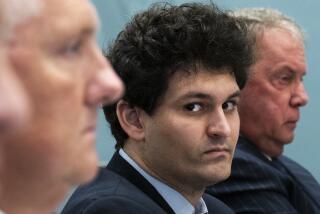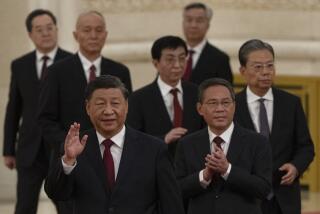Reading Between the Lines of Jiang’s Reemergence
- Share via
BEIJING — Three years after leaving the political stage, former Chinese President Jiang Zemin is back in the national spotlight. So is the famous slogan that seemed to have retired with its creator: the murky theory of the “Three Represents.”
Jiang, who turned 80 on Thursday, engineered his comeback through the publication last week of his selected works. The series could fill the shelf of a bookcase: three volumes on his personal writings, speeches and decrees, plus 13 that are essentially travelogues documenting his official trips abroad, including his visit to President Bush’s Texas ranch.
State media immediately jumped into overdrive to promote the opus, saying eager readers had been queuing up in bookstores around the country, from sophisticated Shanghai to remote Tibet.
The books’ biggest promoter seems to be Jiang’s successor, President Hu Jintao. This week he called on all Communist Party members to study the chronicles, describing the series as the “best textbook” for the understanding of the principles of the Three Represents and for pushing forward “the great cause of socialism with Chinese characteristics,” the official New China News Agency reported.
On the surface, it might appear that Jiang’s vision for modern China has reemerged and triumphed over the ideas of Hu, at least for now. But, as is often the case in Chinese politics, analysts caution that things may not be what they seem.
The doctrine of the Three Represents holds in part that the Communist Party should represent the interests of capitalists as well as the working poor. This support for the long-condemned entrepreneurial class followed a period of fast economic growth during Jiang’s rule in the 1990s, especially in the wealthy coastal areas around Shanghai, the former leader’s traditional power base.
Hu, by contrast, was groomed in the poorest parts of inland China. Since coming to power in 2003, he has been promoting a different agenda. His own catch phrase, “harmonious society,” eclipsed the Three Represents as the official mantra, and embodies a populous approach focused on pursuing more balanced development and helping those left behind by the economic boom.
In promoting Jiang’s works, analysts say, Hu is not suddenly giving in to his predecessor’s vision, but rather doing what he does best: playing the game to his own benefit.
“This is more lip service than substance,” said Cheng Li, a China expert at the Brookings Institution in Washington. “China’s development strategy has already shifted in line with Hu’s strategy. What Jiang gets is status but not real power. This just shows how skillful Hu is at manipulating the Chinese political system.”
More than an apt 80th birthday present, the publication of Jiang’s books and the lavish praise for them could be the result of some behind-the-scenes political bargaining.
Jiang is not only concerned with shaping his legacy, but might also be clinging to the notion that he can influence the selection of the country’s top leadership at next year’s 17th Party Congress.
At the last congress, convened less than a year after he stepped down as president, Jiang was able to install a majority of his proteges on the allpowerful nine-member standing committee. Most of them are approaching retirement age and will have to relinquish their positions. The question remains whether they will be able to appoint any allies.
“Hu could be saying, ‘I’ll let you publish your books, but you might lose another seat on the standing committee,’ ” Li said. “It’s like saying to a kid, ‘I can’t give you candy or ice cream, but I can take you to the movies.’ ”
Jiang was never as towering a figure as his predecessors, Mao Tse-tung and Deng Xiaoping. At this point, he may have little say in picking the next leaders.
Once Hu can appoint his own people to top spots in the government, he probably could shake off Jiang’s lingering influence more easily.
“Hu is certainly trying to position himself for a big win at the 17th Party Congress,” said Kenneth Lieberthal, a China expert at the University of Michigan. “So far he’s been a consensus builder. He plays his cards close to his vest and never lets loose what he thinks. When he has a majority on his side, we’ll have to see if this remains his style.”
Meanwhile, China’s more than 70 million party members may be facing a few more study sessions on the old Three Represents.
Such rote lessons might seem a throwback to China’s more doctrinaire communist era, but they will persist unless China becomes a society ruled by law rather than man, said Hu Xingdou, an economist at the Beijing Institute of Technology.
“China still needs study sessions to unify thought and stabilize society,” Hu said. “Without study sessions, they are afraid there would be chaos.”
At the same time, what’s being studied can still hold the key to who’s on top.
“Don’t be fooled by the study sessions,” said Li, of the Brookings Institution.
“Under Hu Jintao, they study a lot of things, like Confucianism, Marxism, even democracy. I think the Three Represents will disappear in a few weeks. Harmonious society is still the dominant theme.”
More to Read
Sign up for our Book Club newsletter
Get the latest news, events and more from the Los Angeles Times Book Club, and help us get L.A. reading and talking.
You may occasionally receive promotional content from the Los Angeles Times.










